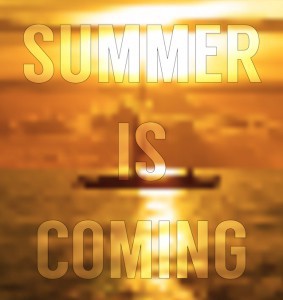For most people, the fifth season premiere of “Game of Thrones” on HBO Sunday means a return to a sweeping story of politics, intrigue, love, and death filled with nudity and violence. For a smaller group, it means a return to a sweeping parable of climate change, filled with nudity and violence.
In that smaller group, a leader has emerged. She is not Daenerys Targaryen, Mother of Dragons. She is Manjana Milkoreit, a post-doctoral Fellow with the Walton Sustainability Fellowship Program at Arizona State University.
For those unfamiliar with “Game of Thrones” and why many see it as a climate parable for Earth, here’s the story. The imminent climate change faced by the continent of Westeros is a long period of very cold weather (and various scary things associated with it, like the White Walkers). “Winter is Coming,” as the family motto of the noble House Stark in the north puts it. The defenders against the scary things are “The Night’s Watch.” The various factions who represent different parts of the country are too busy fighting for power to pay any attention to warnings about climate change and its grim consequences. Oh wait, maybe that’s America.

On Earth, the imminent climate change we face is a long period of increasingly hot weather. “Global warming is coming” as we’ve been warned for decades by the noble house of climate scientists, who generally get ignored, bullied, and even slaughtered at weddings. Oh wait, that’s the Starks. Maybe the scientists are more like the Night’s Watch, stoically defending against the climate science deniers and disinformers, whose undead talking points are almost almost impossible to kill.
If you are wondering how one becomes the world’s expert on climate change and “Game of Thrones” [aka GOT], the answer is two things. First, you write a 40-page scholarly paper, “Winter is Coming”: Can Game of Thrones change Climate Change Politics? Then you get Reuters to write a story about you, “Is ‘Game of Thrones’ aiding the global debate on climate change?”
Dr. Milkoreit’s paper is not online yet, but I have read a draft. A key point, as the conclusion states, is:
Humans are story-tellers. GOT is offering its mainly American audience a wealth of story-telling material that political actors are beginning to use to make interventions in ongoing debates about climate change.
It is an academic paper, so the next line is, “This paper has used a cognitive-affective analytical framework and the concept of pop-cultural mobilization to explore the content of a set of blog posts that link GOT and climate change politics, as well as the motivations of the blogs’ authors.” I forgot to mention her paper analyzes in detail several blog posts on the climate-GOT link (not mine) — such as “9 Things Game of Thrones Taught Me About Climate Change.”
Milkoreit told me that the online discussion of the GOT-climate link was another “signal that climate change is moving into the social and cultural sphere.” This led to the question of whether “Game of Thrones” was part of the larger emerging CliFi (climate fiction) genre, which includes “Snowpiercer,” “The Day After Tomorrow,” and Margaret Atwood’s MaddAddam trilogy.
Does CliFi only include stories where the climate change is human caused? That seems a bit narrow. Under that definition, “The Hunger Games” books are pretty clearly CliFi, while the movies are not, since they are stripped of any reference to what caused the catastrophic food shortage. On the other hand, if climate fiction covers any fiction where the climate is changing or has changed rapidly, then it might include a great deal of stories going back to very ancient times, such as Gilgamesh. Something for the scholars to work out.
Manjana Milkoreit does not spend all of her time on “Game of Thrones” and climate change. She “recently helped establish the Imagination and Climate Futures Initiative,” which is an ASU “partnership that harnesses the power of our collective imagination and bridges the gap between the hard and soft sciences to invent and deliver solutions for a sustainable future.”
In November, Margaret Atwood came to ASU to present the inaugural lecture of this Initiative. The award-winning SciFi and CliFi author explained that she takes the expansive view: “I think calling it climate change is rather limiting. I would rather call it the everything change. Everything is changing in ways that we cannot yet fully understand or predict.”
Unknown iFrame situation
If you were wondering whether Milkoreit’s career choice — exploring climate futures — had any connection to her name, Manjana, which means “tomorrow,” you are not alone. When I asked, she paused and said that no doubt she was given that name to inspire a “sense of optimism about the future” … and that she is “working hard to keep it.” So are we all.
